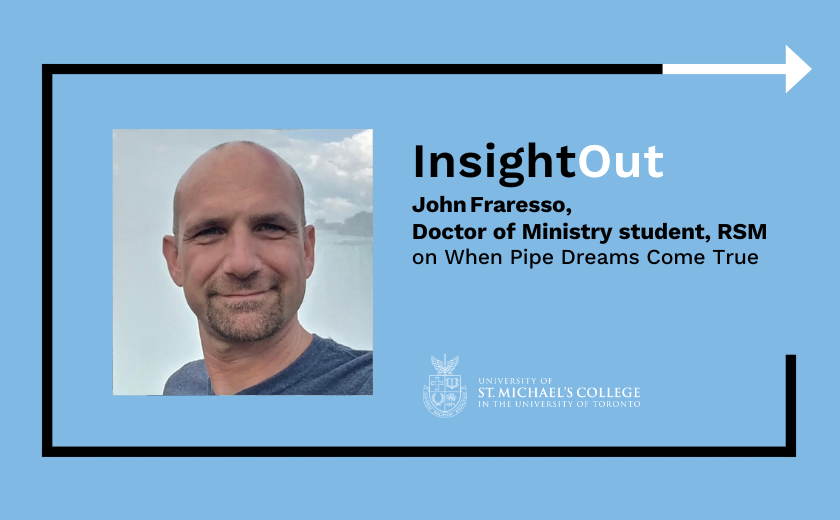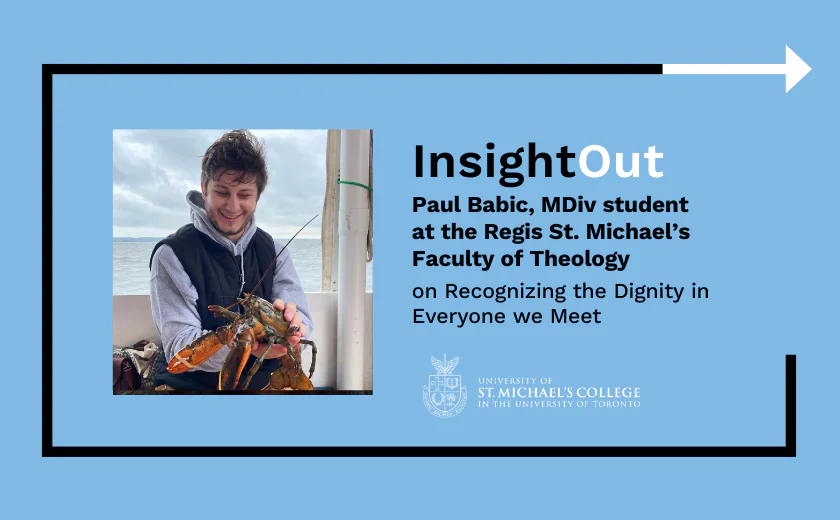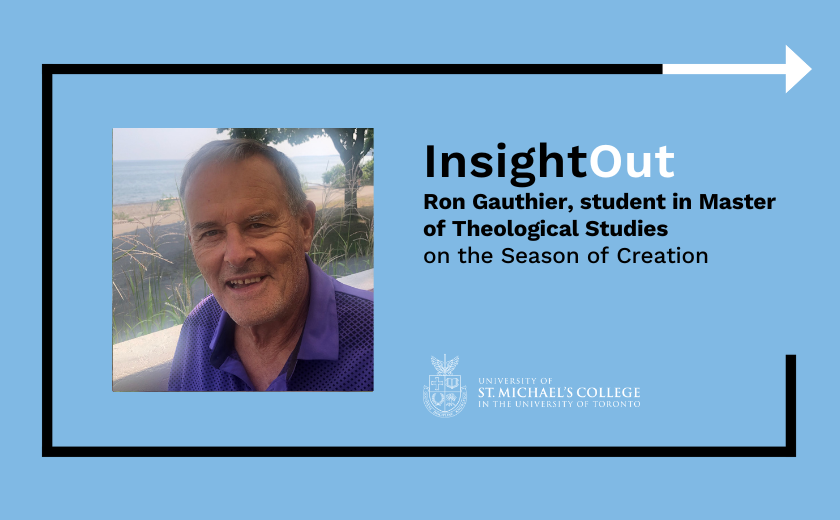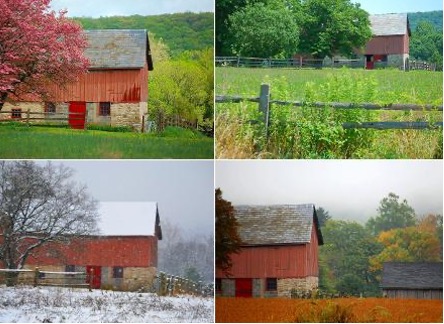
Category: InsightOut


Fr. Michael Bombak is a Ukrainian Catholic priest whose journey began in Edmonton with early education in the Ukrainian Bilingual Program and a teaching career before entering the seminary. His vocational discernment led him to Holy Spirit Seminary in Ottawa, culminating in his ordination as a priest in 2016. He served as Assistant Pastor at St. Josaphat Cathedral, then as pastor of the Vermilion District, and later at St. Stephen Protomartyr Ukrainian Catholic Parish in Calgary. Fr. Michael earned a Master of Theology from Newman Theological College, publishing his thesis on theological anthropology and contraception. He is currently a Doctorate in Ministry student through the Toronto School of Theology, University of Toronto and serves as the Chaplain and Programming Coordinator of the Metropolitan Andrey Sheptytsky Institute. He is married with five children and enjoys mountain climbing and hiking.
On the Road to Emmaus in the Gospel of Luke, the two disciples, grieving the loss of their Lord, while travelling, inadvertently meet Him along the way, and enter into a deeper relationship with Him through their minds being opened to recognize Him in the Scriptures and in Communion in the breaking of the Bread (Luke 24:13-35). With their hearts “burning within them” they travel through the night to share this good news with the other disciples only to discover that the news has already reached them!
This incredible story of encounter, consolation and conversion is the foundation of the new Metropolitan Andrey Sheptytsky Institute’s Discernment Program: “The Road to Emmaus Discernment Year.” Offered in cooperation with The University of St. Michael’s College Continuing Education Division, the program runs an entire academic year, from September to June, beginning with an opening retreat and closing with MASI’s annual popular theological conference “Study Days” to give participants a wider experience of the Church and a taste of deeper intellectual life.
Although originally envisioned as a program specifically targeted to local men discerning Holy Orders in the Ukrainian Greek Catholic Eparchy of Toronto, the initial meeting of the vocations commission concluded that the program would additionally be of great value to lay leaders. The program went from local in scope to broad with the help of the resources of The University of St. Michael’s College Continuing Education, which has leveraged online classroom delivery technology to support cohorts of the program in New Westminster, B.C., Calgary, AB, and several participants from Ontario and American parishes. In August, I had the joy of delivering an opening retreat for the good people of the New Westminster Eparchy at Holy Eucharist Cathedral, followed by another retreat here recently on campus at St. Michael’s College. One of the participants shared:
The Road to Emmaus opening retreat was very stirring for a young man hoping to discern and grow in prayer, love, and immersion in the beautiful spirituality of Eastern Christianity. All the speakers were full of humble wisdom and poured out such great knowledge on us that simply taking notes was not enough to absorb it all. This retreat has set the tone for the year ahead, and I look forward with great enthusiasm to all that is to come.
Often in ministry we can assume too much. When I was teaching grade eight English Language Arts one year, I asked my returning students to write a paragraph for me. After collecting these I realized my mistake- we should have started with sentences! While attending MASI Study Days in 2008 I remember Fr. Thomas Hopko, then Dean of St. Vladimir’s Orthodox Seminary, lamenting the fact that his seminarians were very excited to read the more mystical writings of the Philokalia but had not yet read the Gospel of Mark!
In ministry we can make this same mistake in rushing past Kerygma to get to deeper Catechesis, and designing programs tailored towards producing ministry skills before a relationship with Christ is established. When Christ calls the twelve in the Gospel of Mark He does so first “so that they might be with Him” and then to go out and preach and cast out demons (Mark 3:13-19).
This “Road to Emmaus” seeks to provide the context for encounter with Christ in the breaking open of the Scriptures and the breaking of the Bread in an active and intentional year of discernment and prayer as a community and in cooperation with the participant’s parish. By the end of the program, participants will have read 14 script,ural books in narrative order, providing them with an “overview” of salvation history, read most of “Christ our Pascha,” the Catechism of the Ukrainian Greek Catholic Church while benefitting from video lectures through the online resource “Becoming Byzantine,” and participated in two “Jesus Prayer Challenges” over the major fasting periods of the year. This discernment year is about encounter, and this encounter is fostered through prayer.
Animating the engagement with the riches of tradition is the commitment to spiritual discipline and intentional Christian love entailed in this program. It is my sincere hope that graduates of The Road to Emmaus—or better, successful pilgrims— will leave the program with a deeper understanding of Scripture, Church teaching and Spiritual practice, but most importantly, with a deeper hunger and longing for the Living God.
Read other InsightOut posts.


John Fraresso is currently in his second year of the Doctor of Ministry program at the Regis St. Michael’s Faculty of Theology (RSM) and is the Spiritual & Community Life Coordinator at L’Arche Hamilton.

Regis St. Michael’s student Paul Babic reflects on a papal invitation to respect the dignity of all.

Ron Gauthier recently retired from corporate life after roughly 50 years in the agribusiness field. Born and raised in Montreal, his career took him to the Greater Toronto area in 1984. He graduated with a Bachelor in Agricultural Sciences and Diploma in Management from McGill University. Before the pandemic, he enrolled part-time in a Master of Theological Studies degree at Regis College, with focus on eco-theology and Ignatian spirituality. Ron is a 4th-degree Knight of Columbus, an RCIA Leader at Mary Mother of God Parish, Oakville; a STIR (Spiritual Transformation in Recovery) Toronto Retreat Coordinator; and a member of the Board of Governors of Catholic Mission of Canada. Ron is happily married to his sweetheart of 37 years, Chantal, with three great sons, two beautiful daughters-in-law, three grandchildren and one more little angel on the way.
September is upon us. It must be. It’s the return to school for our grandkids and for yours truly as part time Regis student in eco-theology. Return to school brings back a lot of good memories of my own return to school years ago and of my three sons through the years and now of my grandkids.
Return to school also makes me think of fall quickly approaching. It has always been my favourite season. Temperatures begin to drop and vegetative growth decreases, its harvest time with its Harvest Moon. There’s a special smell in the air, nature is on fire with its strong red and orange colours, its Halloween and pumpkin pie time. Animals are busy preparing for winter and regular flights of geese above our heads are announcing something’s happening.
Fall also makes me nostalgic. As you grow older, time flies faster. As you often hear these days: “Where has summer gone?”. A summer never to come back. Only beautiful memories to cherish. It seems like yesterday when my dear wife and I left on June 10th for a wonderful trip by car to the Maritimes. After 21 beautiful days of gorgeous weather and 6,500 kilometres, we came back with a great number of pictures and unforgettable memories of the warm friendly Maritimes hospitality, seashore fishing villages, the St. John-Digby ferry crossing, the Cape Breton highlands and Cabot Trail, the whole landscape splendour. PEI and its red soil potato fields, its miles and miles of beautiful wild beaches. Sailing out to the ocean on the Bluenose II from Lunenburg, feasting on seafood. All stand out in my mind. We saw nature’s beauty at its best. A trip never to forget. Yes. Where has summer gone?

Indeed, every year through God’s creation, nature gives us a beautiful spectacle in four acts with its four seasons. Each season has its own gifts. It’s like seeing the same view through your living room window but that view is painted differently with different colours from season to season. For classical music fans, it’s like Vivaldi’s Four Seasons. A different style, a different feeling for each season.
Our very distinctive seasons also remind me of life’s growth from birth to death. For me it’s the circle of life (a la Lion King) which spiritually symbolizes the continuous cycle ofbirth, growth, death, and rebirth. Just as the seasons change and flow flawlessly into one another, so too does life follow a natural rhythm. Every day, many leave us. Every day many are born.
At fall we become nostalgic and we look back at great summer months gone buy so quickly. Then the trees start to slowly shed their leaves after showing us their colorful spectacle, announcing the arrival of winter not too far away. Winter a time of reflection when nature takes a pause but still leaving us its special wintery sceneries until spring shows up all over again. Nature’s resurrection with all its awakening, energy and growth, leading us again to summer with all its greenery and maturity.
Nature through God’s creation allows this beautiful cycle every year. And all this, from a scientific point of view, because of the change of tilt of the Earth’s axis as it orbits the sun. And this has been happening with the same precision year after year since the Earth’s creation. And by the way, (after research) a change of tilt of up to 23.4 degrees. What precision! It begs to be asked: “who’s at the command?”
To help us meditate on all of this, with the arrival of September and fall we celebrate the annual Season of Creation from September 1st to October 4th (The feast of St Francis of Assisi). (Press Release: Laudato si’ Movement: Season of Creation 2024: “To hope and act with Creation” (vatican.va). This is an invitation to pray and respond to the cry of Creation. The theme for the 2024 Season of Creation is “To hope and act with Creation”. This theme corresponds to a powerful call to action to foster hope in the face of ecological challenges. (Season of Creation 2024 – Office For Justice, Ecology and Peace (catholic.org.au)
As described on the web. In 1989 Ecumenical Patriarch Dimitros I proclaimed September 1st as the Orthodox Day of Prayer for Creation. Subsequently, the World Council of Churches (WCC) extended the celebration until October 4, the feast day of St. Francis of Assisi. In turn, in 2015 Pope Francis made the Season of Creation official for the Roman Catholic Church.
The Season of Creation and the four natural seasons remind us of the beauty and diversity of the world we live in, encouraging us to appreciate and care for our environment. It’s an opportunity for all Christians to become more mindful and aware of God’s Creation, of God great gift to us. A time to celebrate this great creation gift and to wake up and care for it with gratitude We are to ask pardon for having taken for granted the environment we live with and that has become unprotected. The air we breathe, the water we drink, the food we eat, the sound of our environment we hear against the noise pollution background, the canvas of nature’s beauty we see, the trees and forests, the mountains, the fields and land, the rivers and oceans, the beaches. And the wrongful exploitation of natural resources.
The Season of Creation is also a time to ask God for us to consciously heal and renew our Earth together as a community. In Laudato Si (Praise be to You), Pope Francis’s encyclical on the environment and its follow up document a few years after, Laudato Deum (Praise God), (Which I invite you to read both “easy to read” documents) focus attention on the fact that climate crises are rooted in our attitudes and values: the uncontrolled pursuit of wealth through exaggerated consumerism, the focus on economic growth at any cost through human greed, the exploitation of limited natural resources, our selfishness towards others globally and disrespect towards the common good of this earth.
In his book Value(s): Building a Better World for All, Mark Carney, former governor both of the Bank of Canada and the Bank of England, claims that much of western society is morally rotten and has been corrupted by “greedy “capitalism, which has brought about a “climate emergency” that threatens life on earth. This, he claims, requires rigid controls on wrongful personal and industry freedom and corporate funding.
Pope Francis has said many times that “the ecological crises of our times are spiritual in their roots. What is needed is a strong spirituality to come up with significant personal and social changes.”
The Season of Creation is a great opportunity to be more aware and conscious of such a spirituality. As Pope Francis says: “We need to seriously consider focusing on an ecological conversion” in our ways of praying, thinking, living, studying, discussing, changing, helping out, not alone but through community spirit.
During the Season of Creation, we should all take the opportunity to focus on our own ecological conversion by not only paying more attention to our carbonfootprints but also by being in-awe in front of God’s Creation and by being grateful and caring of the environment and nature and of all its beauty. All this, in communion with all creatures including humankind and nature.
Happy and Blessed Season of Creation!
Read other InsightOut posts.
